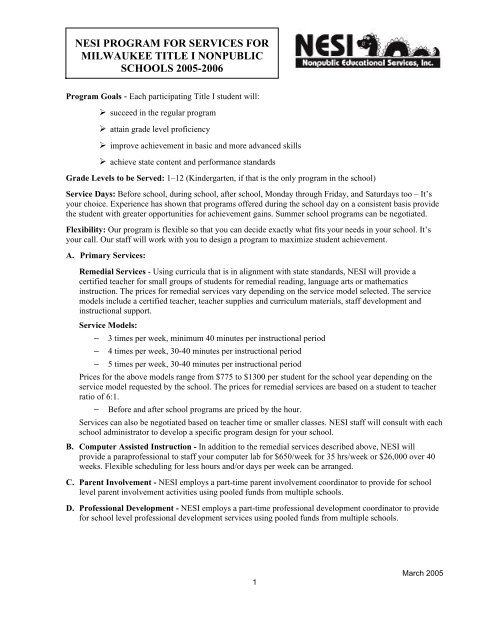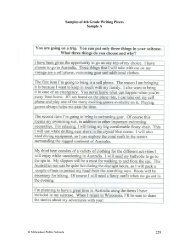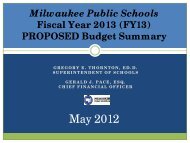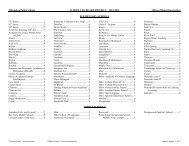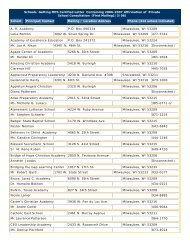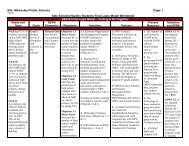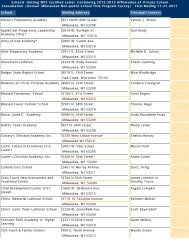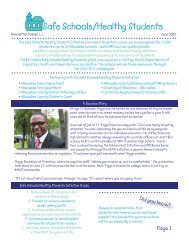nesi program for services for milwaukee title i nonpublic schools
nesi program for services for milwaukee title i nonpublic schools
nesi program for services for milwaukee title i nonpublic schools
Create successful ePaper yourself
Turn your PDF publications into a flip-book with our unique Google optimized e-Paper software.
NESI PROGRAM FOR SERVICES FORMILWAUKEE TITLE I NONPUBLICSCHOOLS 2005-2006Program Goals - Each participating Title I student will:‣ succeed in the regular <strong>program</strong>‣ attain grade level proficiency‣ improve achievement in basic and more advanced skills‣ achieve state content and per<strong>for</strong>mance standardsGrade Levels to be Served: 1–12 (Kindergarten, if that is the only <strong>program</strong> in the school)Service Days: Be<strong>for</strong>e school, during school, after school, Monday through Friday, and Saturdays too – It’syour choice. Experience has shown that <strong>program</strong>s offered during the school day on a consistent basis providethe student with greater opportunities <strong>for</strong> achievement gains. Summer school <strong>program</strong>s can be negotiated.Flexibility: Our <strong>program</strong> is flexible so that you can decide exactly what fits your needs in your school. It’syour call. Our staff will work with you to design a <strong>program</strong> to maximize student achievement.A. Primary Services:Remedial Services - Using curricula that is in alignment with state standards, NESI will provide acertified teacher <strong>for</strong> small groups of students <strong>for</strong> remedial reading, language arts or mathematicsinstruction. The prices <strong>for</strong> remedial <strong>services</strong> vary depending on the service model selected. The servicemodels include a certified teacher, teacher supplies and curriculum materials, staff development andinstructional support.Service Models:− 3 times per week, minimum 40 minutes per instructional period− 4 times per week, 30-40 minutes per instructional period− 5 times per week, 30-40 minutes per instructional periodPrices <strong>for</strong> the above models range from $775 to $1300 per student <strong>for</strong> the school year depending on theservice model requested by the school. The prices <strong>for</strong> remedial <strong>services</strong> are based on a student to teacherratio of 6:1.− Be<strong>for</strong>e and after school <strong>program</strong>s are priced by the hour.Services can also be negotiated based on teacher time or smaller classes. NESI staff will consult with eachschool administrator to develop a specific <strong>program</strong> design <strong>for</strong> your school.B. Computer Assisted Instruction - In addition to the remedial <strong>services</strong> described above, NESI willprovide a paraprofessional to staff your computer lab <strong>for</strong> $650/week <strong>for</strong> 35 hrs/week or $26,000 over 40weeks. Flexible scheduling <strong>for</strong> less hours and/or days per week can be arranged.C. Parent Involvement - NESI employs a part-time parent involvement coordinator to provide <strong>for</strong> schoollevel parent involvement activities using pooled funds from multiple <strong>schools</strong>.D. Professional Development - NESI employs a part-time professional development coordinator to provide<strong>for</strong> school level professional development <strong>services</strong> using pooled funds from multiple <strong>schools</strong>.1March 2005
NESI PROGRAM FOR SERVICES FORMILWAUKEE TITLE I NONPUBLICSCHOOLS 2005-2006Primary ServicesA. Remedial Services Provided by a TeacherPROGRAM DESCRIPTIONNESI’s teacher will teach in your school at an assignededucationally appropriate location. If your school cannotprovide furniture, NESI will coordinate with MPS to securefurniture <strong>for</strong> the Title I classroom. NESI will supply theteaching materials and supplies, etc. <strong>for</strong> the classroom.The teacher will coordinate with each principal/teacher <strong>for</strong>scheduling <strong>services</strong> to minimize interruptions in the regular<strong>program</strong>. The teacher will work with groups of 1-6 children.Eligible students are selected based upon test scores,FluencyPhonicsWord Recognition-SpellingPhonological AwarenessPhonemic Awarenessteacher recommendations, or other diagnostic in<strong>for</strong>mation. Potential students are ranked according to needwith the lowest per<strong>for</strong>ming students served first.Elements of NESI’s reading <strong>program</strong> (includes language arts) are briefly summarized in the pyramid diagram.Each higher section in this pyramid represents more complex skills; however, the sequential arrangement ofthese skills does not designate teaching order. NESI teachers will use diagnostic instruments to identify theinstructional reading level of each student, coordinate with the regular classroom teacher <strong>for</strong> specific skillsdevelopment and then select appropriate curriculum materials to supplement the regular classroominstruction.NESI’s mathematics <strong>program</strong> promotes understanding of fundamental concepts of number and operations,algebra, geometry, measurement, data analysis and probability, problem solving, reasoning and proof,communication, connections, and representation. Proficiency in mathematical skills and problem solving isalso stressed. Students are guided to achieve more than mere mastery of computational skills; they learn tounderstand the mathematical concepts underlying the skills and to apply those skills to problem-solvingsituations. In the Title I <strong>program</strong>, students are active participants in the learning process. They explore,speculate, and think. When they learn from meaningful experiences, they are more likely to retain the newknowledge. NESI teachers strive to provide experiences <strong>for</strong> students to make sense of mathematics, to viewand use it as a tool <strong>for</strong> reasoning and problem solving.For both reading and mathematics, the NESI teachers per<strong>for</strong>m a complete diagnostic workup to determineeach student’s specific needs. A Personalized Instruction Plan (PIP) is developed <strong>for</strong> each student. The PIP isperiodically reviewed by the regular classroom teacher and the parents or guardians of the student.Our <strong>program</strong> is deliberately designed to be flexible to meet the needs of each private school and participatingstudent. We do not believe an instructional approach with a canned <strong>program</strong> and a rigid curriculum can besuccessful in a <strong>nonpublic</strong> school.NESI assesses the <strong>program</strong> in a number of ways. Initially, we diagnose student specific needs and develop aPIP <strong>for</strong> each student. The student’s PIP is updated quarterly with the progress of the child. NESI also assessesa number of achievement indicators <strong>for</strong> reading and math. These are supplemented with regular teachercommunication <strong>for</strong>ms with assessment of each child’s progress, principal surveys, and parent surveys. NESIinstructional supervisors monitor and evaluate teacher per<strong>for</strong>mance on a regular basis and apply currentresearch strategies <strong>for</strong> teaching remedial reading and math in their comments and reviews of teacherper<strong>for</strong>mance. NESI will provide end of the year student progress reports to each school.2March 2005
NESI PROGRAM FOR SERVICES FORMILWAUKEE TITLE I NONPUBLICSCHOOLS 2005-2006B. Computer Assisted InstructionMany <strong>schools</strong> have computer labs with SuccessMaker software previously paid <strong>for</strong> with Title I funds. Inaddition to remedial instructional <strong>services</strong>, NESI will staff these labs with a paraprofessional depending onyour needs. Many of our paraprofessionals and teachers attended MPS SuccessMaker training in 2003 and areimplementing the components of the software into the overall remedial <strong>program</strong>.Other ServicesA. Parent InvolvementNESI’s approach to parent involvement flows from five types of activities. 1 They are: Home and School asCommunicators; Supporters; Learners; Teachers; and Advisors, Advocates, and Decision Makers. Eachprovides <strong>for</strong> different parent activities from provision of materials to training to participation in <strong>program</strong>designs and evaluations. You guide us on what you need. By <strong>schools</strong> pooling a percentage of their parentinvolvement funds, NESI employs a part-time parent coordinator to coordinate these activities.In school year 2004-05, NESI teachers participated in parent-teacher conferences; distributed a monthlyparent involvement newsletter (English and Spanish versions); conducted teacher home visits; distributedliterature on literacy and other parent support resources, and coordinated workshops and seminars at area<strong>schools</strong> <strong>for</strong> the parents of Title I students. Some of the topics <strong>for</strong> these activities were:• Fostering A Love of Reading In Your Child• What’s Title I? Why Is My Child Involved?• Story Teller: Tejumola Ologboni• Strategies <strong>for</strong> Helping Children with Reading at Home• Make and Take Educational Games Presentation• Reading Discussion by Authors• Student Achievement Celebration• Keeping Skills Up During Summer Months• EfficacyOur roster of distinguished speakers includes: Derrick Brewer, Minimah Shaheed, author; Doris Jude Parker,author; Marshall Gallant, author; Ruth Munro, and Kim Warning, Education Professional and Advocate,Milwaukee Urban Inclusion Collaborative.Other Parent Involvement strategies include “Take Home Packs” with incentive <strong>program</strong>s, ThanksgivingBaskets with educational games, family dinners and other participation incentives.B. CounselingNESI staff includes a licensed social worker who works in <strong>schools</strong> doing individual counseling and groupfacilitation. We also contract with outside agencies to provide counseling <strong>services</strong>, life skills and angermanagementworkshops.C. Professional DevelopmentNESI’s approach to staff development involves not only our Title I teachers but all teachers in the <strong>nonpublic</strong>school who teach Title I students (this really is nearly all teachers in <strong>schools</strong> with over 35% povertymeasures). Our approach includes staff training <strong>services</strong> that introduce materials from current research, to1Chrispeels, J. (1990). Home and School Partners <strong>for</strong> Student Success, A Handbook <strong>for</strong> Principals, San Diego, City Schools.March 20053
NESI PROGRAM FOR SERVICES FORMILWAUKEE TITLE I NONPUBLICSCHOOLS 2005-2006academic standards, assessment methods, and other in<strong>for</strong>mation that develops competencies in a goodteacher. You select the specific training that is needed. By <strong>schools</strong> pooling a percentage of their funds, NESIcan employ a part-time professional development coordinator to schedule these activities.Some of the activities NESI sponsored in 2004-2005 <strong>for</strong> the private school teachers of Title I students were:• Interactive Workshop: Our Children are our Most Precious Resource, Dr. Howard Fuller• Love & Logic, Jim Fay• Fearless Learning Workshop, Harriett Ball• Literacy Series, delivered by Cardinal Stritch Faculty• RLA 501: Advanced Curriculum & Methods in Reading & Language (1 credit), Cardinal Stritch Faculty• Gang Violence and Health and Wellness, Jose Flores• Education Retreat 2005 (1 credit opt.), Cardinal Stritch Faculty• Classroom Management, Brenda Ward• Motivation, Tracey Wiegel• Differentiated Instruction, Kimberly Strike• Wisconsin State Reading Convention 2005• Backward Design: Concept Curriculum, Paul Weber, Cardinal Stritch• Stack the Deck Writing Program, Herb Hrebic• Six Traits of Writing (2 credits), Cardinal Stritch University• Efficacy, Derrick Brewer• Rubric Writing Workshop, Cardinal Stritch UniversityNESI ExperienceNESI has provided Title I <strong>services</strong> since 1979 <strong>for</strong> <strong>nonpublic</strong> <strong>schools</strong> in 13 school districts in Virginia. NESIhas produced significant achievement gains <strong>for</strong> its students: +4.7 Normal Curve Equivalents (NCEs) inReading and +5.1 NCEs in Math (approximately a 10% percentile increase in achievement). NESI hasprovided basic skills instruction to students on 50 military bases in the U.S. over the past 20 years. Morerecently, NESI has provided Title I <strong>services</strong> in 100 <strong>nonpublic</strong> <strong>schools</strong> in Missouri and 57 <strong>nonpublic</strong> <strong>schools</strong> inthe City of Milwaukee.Our project level personnel are highly qualified to execute the Title I <strong>program</strong> <strong>for</strong> your <strong>nonpublic</strong> school.They are:Contact In<strong>for</strong>mationProject Director/Instructional Supervisor Daniel BieserInstructional SupervisorsTracy Laster and Julie PalkowskiAdministrative/Teacher AssistantVicki HoppeParent Involvement CoordinatorsMary Miller and Vicki HoppeProfessional Development Coordinator Felix GabrielAt-Risk Prevention SpecialistCharisse SekyiCertified CounselorMary HershbergerFull and part time certified Teaching Staff and ParaprofessionalsLocalDaniel Bieser, Project Director2315 W Good Hope Road, Ste 1Glendale, WI 53209414-247-0910dbieser@<strong>nesi</strong>hq.orgCorporateRochelle SchneickertVice President, Executive DirectorCompensatory Education Group3421 Commission Court, Suite 201Woodbridge. VA 22192888-494-7882rschneickert@<strong>nesi</strong>hq.org4March 2005


